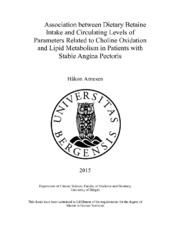Association between Dietary Betaine Intake and Circulating Levels of Parameters Related to Choline Oxidation and Lipid Metabolism in Patients with Stable Angina Pectoris
Master thesis
Permanent lenke
https://hdl.handle.net/1956/11677Utgivelsesdato
2015-05-15Metadata
Vis full innførselSamlinger
Sammendrag
Cardiovascular disease (CVD) is among the leading causes of death worldwide, and is strongly influenced by lifestyle. Thus, promoting a healthy lifestyle, which includes having a healthy diet, is among the primary preventive strategies for reducing future risk of cardiovascular events. Elevated circulating total homocysteine (tHcy) is an independent risk factor for CVD. However, Hcy lowering treatment has not proven to reduce mortality or cardiovascular events among patients with CVD, and the mechanism linking tHcy to disease risk has not yet been discovered. Thus, the metabolic pathways surrounding Hcy, including the one-carbon metabolism and the choline oxidation pathway, are very interesting targets for investigation. Betaine is a micronutrient that is achieved mainly from the diet or endogenously by irreversible mitochondrial oxidation of choline. Betaine lowers tHcy concentrations in the liver and kidney by serving as a methyl donor in a reaction catalyzed by betaine- homocysteine methyltransferase. This reaction represents the first step along a transmethylation pathway, which provides three available methyl groups in the one-carbon metabolism. Betaine is thus considered to be an important modulator of the one-carbon metabolism. Furthermore, betaine-dependent remethylation of Hcy produces methionine. Betaine has thus been hypothesized to affect the hepatic lipid metabolism by producing sufficient amounts of methionine which enters a pathway that ultimately leads to increased synthesis and secretion of lipid-rich very-low density lipoproteins (VLDLs). Objective: The main aim of the current study was to explore the associations of reported dietary betaine intake with circulating levels of metabolites along to the choline oxidation pathway and lipid related parameters in patients diagnosed with stable angina pectoris (SAP). A secondary aim was to explore potential effect modification by folate status and statin treatment. Methods: This cross-sectional study was based on the Western Norway B-vitamin Intervention Trial, and included 2026 SAP patients with angiographically verified coronary artery disease, and available dietary data. Average daily dietary intakes during the recent year were assessed by a 169-item food frequency questionnaire. Standard blood laboratory parameters were measured according to routine protocols at the two university hospitals in Western Norway. The associations between reported dietary betaine intake and one-carbon metabolites, including choline oxidation, were assessed by Spearman´s rank correlations, adjusted for age, gender, total energy intake and statin treatment. Multiple linear regression was used to explore the relationship between reported dietary betaine intake by quartiles and according to the upper decile, and levels of lipid related parameters, and were adjusted for age, gender, body mass index (BMI), total energy intake, current smoking, statin treatment and diabetes. We also evaluated the effect modification by folate status and statin treatment in these linear regression analyses. Results: Median dietary betaine intake in this cohort was 134 mg/d. The participants (80.4% males) had a median age of 62 years. Unadjusted Spearman correlation analyses revealed a significant positive association of dietary betaine intake...
